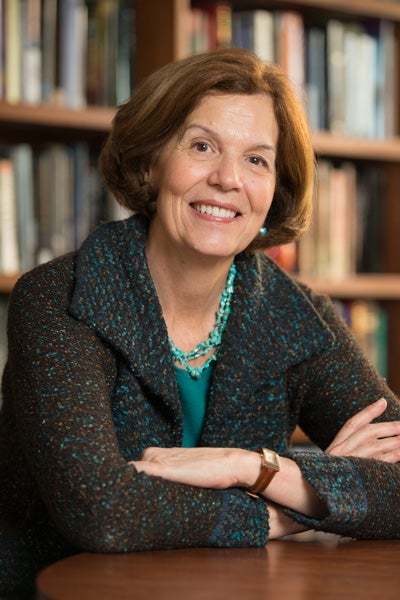|
April 5, 2013
'Pied Piper of new research-based legal education' chosen for 2013 Roland Volunteer Service Prize
The Miriam Aaron Roland Volunteer Service Prize recognizes Stanford faculty who engage and involve students in integrating academic scholarship with significant and meaningful volunteer service to society. By Kathleen J. Sullivan

Stanford law Professor Joan Petersilia has won the 2013 Roland Volunteer Service Prize for her efforts in integrating scholarship and community service. (Photo: Linda A. Cicero / Stanford News Service)
Stanford law Professor Joan Petersilia, who has won praise for her excellent teaching, generous and inspiring mentorship, rigorous social science research and decades of public service scholarship, will receive the 2013 Miriam Aaron Roland Volunteer Service Prize.
Petersilia, who holds a doctorate in criminology, law and society from the University of California-Irvine, joined the Stanford Law School faculty in 2009. She will receive the Roland Prize at an awards luncheon next week.
Petersilia is the faculty co-director of the Stanford Criminal Justice Center, which promotes and coordinates the study of criminal law and the criminal justice system, including legal and interdisciplinary research, policy analysis, curriculum development and preparation of law students for careers in criminal law.
The Haas Center for Public Service awards the annual prize to members of the faculty "who engage and involve students in integrating academic scholarship with significant and meaningful volunteer service to society." It was created by alumna Miriam Aaron Roland and includes a $5,000 cash award. Petersilia will be the 15th faculty member to receive the award since it was established in 2004.
Provost John Etchemendy will present the Roland Prize at an awards luncheon on April 11.
Petersilia, who said she was "honored and humbled" to be chosen for the prize, said she has long been fascinated by the way laws and public policies affect – often in unforeseen ways – the everyday lives of people, especially the disadvantaged.
Most law schools, she said, don't have social scientists on their faculties.
"What I love is that I can bring a different perspective to students who will become the future thought leaders," Petersilia said.
"When students come into my juvenile justice, sentencing and corrections, or advanced public policy courses, they have already completed the doctrinal criminal law classes. I tell them: 'You know how somebody gets convicted; now we're going to talk about the impact of that conviction on the offender, families and the community.' I also want them to appreciate the impact of crime on victims."
Elizabeth Magill, dean of Stanford Law School, said students she has spoken to have described their contact with Petersilia as a life-changing experience.
"One young woman I met told me that she had only a passing interest in criminal justice issues until she encountered Joan," Magill wrote in a letter nominating Petersilia for the prize. "After taking Joan's class and working with her, she reoriented her career goals around work in this policy arena. Another student I know was so inspired by the work she did with Joan that she started a new nonprofit aimed at assisting women before they are released from prison."
Under Petersilia's leadership and supervision, the Stanford Criminal Justice Center has created new pro bono opportunities for students: Project ReMADE, which teaches women recently released from prison how to start their own businesses, and the San Quentin Prison Workshop, an academic workshop for Stanford graduate students and Prison University Project students.
"She has the unique ability to be committed to gaining unbiased insights into the criminal justice system, while also maintaining a deep compassion for all involved," Angela McCray, the third-year law student who founded Project ReMADE wrote in a letter nominating Petersilia for the prize.
Two years ago, Petersilia designed a new course to give students the opportunity to engage in real-world crime policy analysis.
Students enrolled in Advanced Seminar on Criminal Law & Public Policy: A Research Practicum, have prepared policy briefs evaluating the impact of California's historic 2011 Public Safety Realignment law on public safety for California Attorney General Kamala Harris and for Matt Cate, former secretary of the California Department of Corrections and Rehabilitation. A group of law students recently presented their research findings to California Gov. Jerry Brown.
Stanford law Professor Robert Weisberg, faculty co-director of the Stanford Criminal Justice Center, said Petersilia has transformed the criminal law curriculum by challenging students to do original, rigorous social science research, and to use social science research tools to test hypotheses about the effects of legal doctrine.
He said Petersilia quickly became a magnet for students yearning to do policy research about the legal issues that were their most passionate concerns, calling her the "Pied Piper of a new research-based form of legal education."
"For our brightest students, the Law School has gone beyond a mechanism of professional training and conventional academic research to become a veritable public policy think tank," Weisberg wrote in a letter nominating her for the award.
Community Partnership Award winners
The awards luncheon also will feature the presentation of the 2013 Community Partnership Awards, which honor the valuable partnerships that exist between Stanford and its neighbors, and celebrate community efforts that successfully tackle real-world problems and advance the public good.
This year's Community Partnership Award winners are:
- Stanford Academic Alliance for Global Enrichment, a partnership between Bay Area high schools and the Center for Latin American Studies that brings high school students to campus for a year-long academic program of mentoring and supervision by professors and graduate students.
- Stanford at the Tech, a partnership between the Department of Genetics and the Tech Museum of Innovation in San Jose that educates the public about science, encourages K-12 students to become scientists and gives Stanford graduate students and postdoctoral fellows the skills they need to communicate science.
- Stanford GOALS, a multi-year Stanford Prevention Research Center program to evaluate a community-based approach to addressing childhood obesity.
A story about the Community Partnership Award winners will appear next week in Stanford Report.
-30-
|